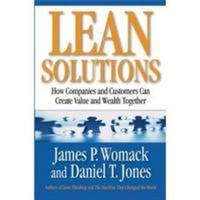Posts selected fromManagement Blog - Engineering Blog - Investing Blog and other blogs - Seven Leadership Leverage Points
IHI has the courage to say one of the 3 sources for there hypothesis as “Hunches, Intuition, and Collective Experience.” While attempting to base plans on data and not hunches is good. Often you must make decisions without data. It is why Dr. Deming was so concerned with mobility of top management: that mobility means many managers don’t really understand what they are managing. Lean thinkers understand the value of having managers with deep knowledge of the areas they manage. continue reading: Seven Leadership Leverage Points - Lean Consumption: the Customer’s Perspective
 The concepts underlying lean consumption boil down to six simple principles that correspond closely with those of lean production.
- Solve the customer’s problem completely by making sure that all the goods and services work together to do so.
- Don’t waste the customer’s (or the provider’s) time.
- Provide exactly what the customer wants.
- ...
continue reading: Lean Consumption: the Customer’s Perspective - Malcolm Gladwell and Synchronicity
- Toyota Engineers a New Plant: the Living Kind
Toyota’s vision:
First, making things that benefit both people and the world as a whole.
…
Second, as a member of society, we must fulfill our responsibilities to all stakeholders. We must provide to customers cleaner, safer, and more attractive products with excellent value. To shareholders, we must enhance share value through long-term and stable growth by increasing profits and paying appropriate dividends. With business partners, we must engage in fair business based on a spirit of mutual benefit.
To our employees, we must provide a workplace where they can work with pride based on mutual trust and responsibility between labor and management, and respect for people.
continue reading: Toyota Engineers a New Plant: the Living Kind - There is Much to Improve in How We Use the Internet to Serve Customers
Webinars can have great interaction. They can provide very useful archived webinars covering some content (live webinars could be provided for free too if the reward was worth the cost) . If the public finds that free content valuable it can be about the most effective marketing in many ways including for gaining customers for live interactive webinars on more advanced topics.
Webinars also allow the presenter to do multiple two hour sessions for different clients anywhere in the world in the same day. So you could customize your content to specific client needs. Also each of those sessions could include employees from multiple sites around the globe. continue reading: There is Much to Improve in How We Use the Internet to Serve Customers - Six Keys to Building New Markets by Unleashing Disruptive Innovation
Unfortunately we do not often stop to examine the theory and therefore fail to learn as we should as we experiment and get new results. The most effective way I know of to improve the learning is to use the PDSA cycle, predict the effects of change and then examining the results of change. As simple as those two acts are, they are skipped far to frequently.
His second point, that managers frequently use overly simplistic models or theories is also important. Management is not well suited for simple theories that can be applied in any situation. Many interdependent variables are often at play and management requires not application of simple rules but applying knowledge in complex situations as best you can. Management is challenging and simple answers are often of little value – even though they are desired. continue reading: Six Keys to Building New Markets by Unleashing Disruptive Innovation - Marketing in a Lean Company
- Going Beyond (or away from) Lean Thinking?
“Lean,” as it is commonly implemented, is not enough.
I believe ideas from Deming that are missing from many lean efforts would be helpful (Toyota applies Deming’s ideas to a much greater extent than those modifying Toyota’s practices for their organization).
Mainly what is needed is for organizaitons to more deeply impliment lean thinking. There is not a need to "go beyond" lean - the problem is poor implimentation not good implimentation of a management philosophy that has been overtaken by some new management ideas that were missing. continue reading: Going Beyond (or away from) Lean Thinking? - New Business Ideas Take Time
- Management Training Program
So I said to the Toyota executive, “You’ve only got two or three suppliers per category, and you never take bids. How do you know you aren’t being ripped off?” So this guy, who was around 60, gives me an incredibly frosty look and says, “Because I know everything.” Everything? “That’s my job,” he says.
Reading “Because I know everything” brings to mind an arrogant blowhard to many in America (I think). Probably because most who would say that, are arrogant blowhards. But when someone has worked (a Toyota executive or a baker) for 40+ years in the same area those words can have quite a different meaning than a 31 year old MBA working in his third industry. Managing with constancy of purpose and long term thinking can make a big difference. continue reading: Management Training Program - Why Fix the Escalator?
I think we all (including me) have to be careful when we make judgments of those we respect or find wanting. It seems our judgments often have more to do with our opinion of the person or company, than the specific behavior we believe we are judging. At times this is wise, I believe, but you should remember the basis for your opinion. continue reading: Why Fix the Escalator? - Interview with Jim Womack (2005)

The whole idea of lean solutions is to start with today’s customer in today’s circumstances and ask what the customer really wants. When we do this, the first thing to note is that manufactured goods have gotten vastly better, somewhat cheaper
...
But we have also noticed for years the growing gap between the factory, where things are getting better, and the situation of providers and consumers where it often appears that things are getting worse.
continue reading: Interview with Jim Womack (2005) - Government Lean Six Sigma
Once the political decision has been made to eradicate polio then that desire can be carried out – and politics really has little impact. Other examples are not as simple. A political decision to eliminate AIDS runs into political controversies in selecting the best strategies to accomplish the goal.
A desire to eliminate hunger, poverty or homelessness run into differing opinions on how those problems should be addressed. I can’t imagine any politician against the elimination of those problems. However, many politicians will be against various tactics to accomplish those goals.
Political decisions have management components but arguing about the poor management effectiveness of political decisions is a bit too advanced for our current capability, I believe. It seems silly for a government to subsidize mansions being built in hazardous areas where insurers would not insure construction, but for political reasons it continues. It seems silly to have the political leadership prohibit the government from negotiating lower drug costs from suppliers, but they do. continue reading: Government Lean Six Sigma - Management Pioneer Peter Drucker 1909 – 2005

The present people in organizations are still stuck in the 19th-century model of the organization. When big business first emerged throughout the industrial world around 1870, it did not emerge out of the small businesses of 1850 — it emerged independently. The only model available, the most successful organization of the 19th century, was the Prussian Army…
The Prussians succeeded because they had created an organization. They were the first ones to use modern technology effectively, which in those days meant railroad and telegraph. Business copied the command and control structure of the Prussian army, in which rank equaled authority. We are now evolving toward structures in which rank means responsibility but not authority. And in which your job is not to command but to persuade.
continue reading: Management Pioneer Peter Drucker 1909 – 2005 - Appreciation for Bill Hunter
 I frequently receive kind words from people who knew my father. A recent note:
I just thought I’d let you know how much I enjoyed your dad’s class as a grad student in 1979 at UW-Madison. I’m sure you’ve heard many comments like this, but I’ll add one more. He was a delightful and entertaining prof who clearly loved his subject. He made an impression on me one day by asking us a question about the British comedy radio program, The Goon Show, which I had heard. I think I was the only member of the class who raised his hand. After that moment, I always felt a special bond with him, because I thought it was great that he appreciated the wacky humor of that show.
I received a wonderful education at UW and your dad was no small part of it.
continue reading: Appreciation for Bill Hunter
|